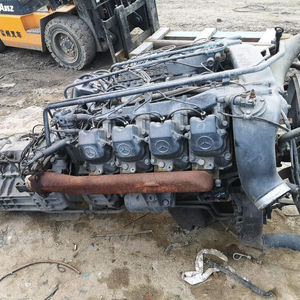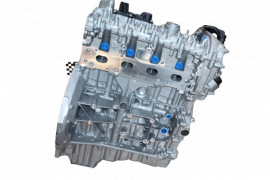Enhance Your Trip with a High-Quality Opel Corsa Engine
Enhance Your Trip with a High-Quality Opel Corsa Engine
Blog Article
Exploring the Inner Workings of a Compact Vehicle's Engine System
As chauffeurs, we often take for provided the complex processes that take place within the confines of our lorry's engine system. In this expedition of a compact automobile's engine system, we will untangle the inner operations of this mechanical symphony, shedding light on the secrets that drive us forward on our day-to-day journeys.
Burning Process Review
The combustion procedure in a small lorry's engine system is an important mechanism that effectively transforms fuel right into power to power the car. This procedure occurs within the burning chamber of the engine, where gas and air mix, fire up, and generate controlled explosions. The burning procedure contains four primary phases: intake, exhaust, compression, and power.
Throughout the intake phase, the piston relocates downward, pulling in a combination of air and fuel right into the combustion chamber. The following stage, compression, entails the piston moving upward, pressing the air-fuel mix to increase its strength. Subsequently, in the power phase, the spark plug sparks the compressed blend, resulting in a fast development of gases that requires the piston pull back. This downward motion generates the power required to drive the vehicle. In the exhaust stage, the burnt gases are eliminated from the combustion chamber with the exhaust shutoff, preparing the chamber for the following cycle. This cyclic combustion process is basic to the operation of a portable vehicle's engine system, making sure efficient energy conversion for propulsion.
Piston and Cyndrical Tube Communication

The piston's exact fit within the cylinder is important for maintaining optimum compression and protecting against power loss during combustion. Limited clearances between the piston and cylinder wall surfaces make sure effective sealing, permitting the piston to move smoothly without permitting gases to leak past. Proper lubrication is additionally crucial to decrease rubbing and wear in between these elements, enhancing long life and performance.
Additionally, the design and products used in making the piston and cylinder influence engine effectiveness and resilience. Modern engines often go to website use lightweight yet sturdy materials like light weight aluminum alloys for pistons and cylinder linings to reduce inertia and improve thermal efficiency. Generally, the unified interaction in between the piston and cylinder is essential to the engine's functionality and general efficiency.
Gas Shot System Functionality
Gas shot systems in compact automobile engines play a vital duty in precisely providing gas to the combustion chamber for effective and regulated ignition. The fuel injection system operates by infusing gas into the combustion chamber at the ideal minute throughout the engine's operation (opel corsa engine). This accurate timing makes certain that the gas mixes uniformly with the air for correct combustion, resulting in enhanced gas effectiveness and lowered emissions
There are mainly two kinds of gas shot systems used in small lorry engines: port gas injection (PFI) and direct gas shot (DFI) PFI systems inject fuel into the intake port prior to the consumption valve, while DFI systems inject fuel directly into the combustion chamber. Both systems have their advantages, with DFI offering much better gas atomization and PFI supplying an extra cost-effective solution.
Comprehending Engine Cooling Systems
Effective procedure of a compact automobile's engine counts heavily on the efficiency of its cooling mechanisms. The cooling system in a small lorry normally is composed of several elements functioning with each other to regulate the engine temperature level. Recognizing these engine cooling mechanisms is crucial for keeping the performance and longevity of a small automobile's engine system.

Exhaust System Parts Explained
The ideal functioning of a small car's engine cooling devices depends on a corresponding system understood as the exhaust system, which makes up various essential parts for making sure reliable exhausts and engine performance. The exhaust manifold collects exhaust gases from the engine's routes and cyndrical tubes Website them to the catalytic converter.
One critical element of the exhaust system is the oxygen sensor, which monitors the oxygen degrees in the exhaust gases to help manage gas consumption and make certain ideal engine performance. opel corsa engine. Furthermore, the resonator might be present in some exhaust systems to lower noise levels. Generally, the exhaust system plays an important duty in preserving engine efficiency, lowering damaging emissions, and making sure a quieter driving experience for compact automobile owners

Final Thought
Finally, the small lorry's engine system is a complex mix of parts that collaborate to facilitate the combustion procedure, convert gas into power, and expel waste gases. Recognizing the internal functions of the engine system, consisting of the piston and cyndrical tube interaction, fuel shot pop over to this web-site system, engine air conditioning mechanisms, and exhaust system elements, is critical for maintaining ideal efficiency and performance of the vehicle.
The combustion process in a small lorry's engine system is a vital system that successfully transforms gas into energy to power the car.Fuel injection systems in small automobile engines play an essential duty in precisely delivering gas to the burning chamber for reliable and regulated ignition.There are largely 2 kinds of gas shot systems utilized in small automobile engines: port fuel injection (PFI) and direct fuel shot (DFI) Understanding these engine air conditioning devices is essential for keeping the efficiency and durability of a small car's engine system.
The ideal functioning of a compact lorry's engine air conditioning systems depends on a complementary system understood as the exhaust system, which comprises various essential parts for making certain effective discharges and engine performance.
Report this page